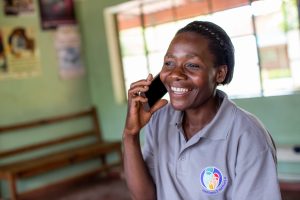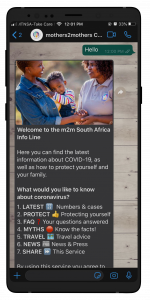eServices – Blending the Technical and the Personal to Keep Clients Healthy During COVID-19
“(eServices) have been really helpful to me as a mothers2mothers (m2m) client, especially during this COVID-19 pandemic. Our health facilities have seen an increase in reported COVID cases, thus I have been scared to go there to collect my HIV treatment. But with the help of the Mentor Mothers reaching us and sending us information through our phones, combined with the information they showed that we can access through WhatsApp, I have gained courage and learned how to protect myself when I go to the clinic.” – Eggy Fikile Nkosie, m2m client, South Africa
When COVID-19 began spreading across Africa last year, m2m moved swiftly to protect the health and wellbeing of the nearly 1,700 women living with HIV employed by m2m as frontline health workers, while ensuring the over one million people we serve each year could continue to get the health services and education they need. We knew that women like Eggy Fikile Nkosie, their children, and their families, would need our help more than ever in the face of not one, but two pandemics—COVID-19 and HIV. We strongly believed “Mentor Mothers” (the women m2m employs as health workers) could continue to provide lifesaving services, while maintaining their personal safety and reducing the impact of COVID-19 in their communities.
This prompted us to look at how we could combine technology with modified in-person services, leading m2m to accelerate the development and launch of two new eServices solutions, which we rapidly rolled across the countries where we operate. They include:
eServices solutions

Mentor Mother reaching client by phone in Mulanje, Malawi
Peer support via phone services:
We rapidly re-purposed our electronic appointment diary as a service delivery tool. Now, Mentor Mothers largely use phone calls to provide clients with routine, continued follow up and support when they are unable to meet their clients in person due to lockdowns and other restrictions related to COVID-19. Some clients have also requested that short messages be sent to them via SMS and WhatsApp to remind them of upcoming appointments.
Virtual Mentor Mother Platform (VMMP):
This interactive chatbot tool, run on the messaging platform WhatsApp, enables users in nine countries, where we operate, to access vital health information and service referrals on COVID-19 and other health topics—such as safe motherhood, healthy childhood, teen health, living with HIV, chronic disease, and family health—from a trusted source at their convenience, and in their preferred language, and which they can easily share with family and friends. Working with a trusted service provider, we developed and rolled out this tool in a matter of months. We have rapidly moved these services to scale.

Virtual Mentor Mother Platform
These eServices are now being implemented in 94% of health centres and communities we serve, and 100% of our clients who have phones in those locations are using at least one of the services. A recent analysis shows that this new way of delivering services is contributing to sustained—and even improved—health outcomes for our clients across the HIV care and treatment cascade, despite significant disruptions caused by the pandemic.
Among the health outcomes we are seeing:
- 97% of infants of m2m clients received a final HIV test at 18-24 months, meaning we have maintained this critical rate at the same level as before COVID-19.
- 85% of clients living with HIV picked up their antiretroviral therapy during COVID-19 with an adherence rate of 97%, higher than the 83% who did before the pandemic.
- 65% of our clients had a viral load test during COVID-19 to determine the progression of the HIV virus, higher than the 60% that did pre-pandemic.
m2m is pleased that although designed and rolled out under pressure, our eServices solution has remained consistent and solid. While some countries have eased lockdown restrictions making it easier for Mentor Mothers to meet their clients in person, we plan to continue to reach and support our clients through eServices and make them an integral part of m2m’s standard service delivery, by continuing to evolve and improve the services informed by the challenges we faced during the roll out.
They include:
- Diverse languages: m2m’s frontline staff speak many different languages, as do the clients our Mentor Mothers serve. We have learned that translation of content for the VMMP into these different languages is a huge and challenging task, but necessary to ensure that users understand the content.
- Mobile phone access: In some of the communities we serve, we have found that a low proportion of clients have access to mobile phones, especially in countries like Malawi and Mozambique. To address this, Mentor Mothers have worked with clients to identify a family member or friend’s phone who they can use, and schedule call times based on this.
- Training challenges: Due to COVID-19 lockdowns and distancing measures, m2m could not rollout and train Mentor Mothers on the new service offerings as we usually do in person. Instead, we conducted the training virtually, including online meetings and phone calls, digital role playing by recording sample client sessions and providing feedback on the Mentor Mothers’ work, and more frequent, time-bound online training sessions.
The fact that eServices are here to stay is welcome news to m2m’s frontline staff, like Sarah Polo, a Community Mentor Mother in Nairobi, Kenya, who says: “eService delivery makes our clients’ lives easier because they are able to access key health information faster and the information is credible. Some people have dropped their guard about COVID-19 and are starting to ignore important health protocols, but the Virtual Mentor Mother Platform (VMMP) is there to always remind and educate them. It is going to save a lot of lives by giving people the information they need to make better lifestyle choices and stay healthy.”
If you are interested in signing up for the VMMP, below are the WhatsApp numbers through which to do so. When you connect to a line, say “hello” to get started.
Angola: +244 922 384 390
Ghana: +233 242 426 504
Kenya: +254 207 640 157
Lesotho: +266 578 147 98
Malawi: +265 999 706 968
Mozambique: +258 843 222 626
South Africa: +27 600 109 000
Uganda: +256 323 200 612
Zambia: +260 962 272 883






















